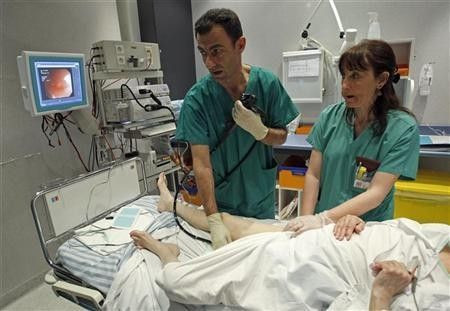Scientists use dead bacteria to kill colorectal cancer cells

A team of Singaporean scientists have successfully used dead bacteria found commonly in soil to kill colorectal cancer cells.
Researchers from the Nanyang Technological University (NTU) claim they were able to harness Clostridium sporogenes bacterium in its dead form, as well as its secretions, to destroy colon tumours cells effectively.
In the study, published in the peer-reviewed journal Scientific Reports the NTU team showed that dead C. sporogenes bacteria can kill tumour cells in an oxygen-starved tumour microenvironment.
They said that the new method addresses the issues of traditional cancer treatments like chemotherapy and radiotherapy, which do not work well in the colon due to reduced blood flow and the lack of oxygen and nutrient flow in the tumour environment. This is because such therapies rely on oxygen molecules to damage the DNA of cancer cells and blood flow to transport therapeutic drugs to the tumour.
This discovery opens new doors for the treatment of colon cancer as bacteria therapy is recently gaining interest as an alternative to traditional treatments, said NTU Professor Teoh Swee Hin, who led the study.
“We found that even when the C. sporogenes bacteria is dead, its natural toxicity continues to kill cancer cells, unlike the conventional chemotherapy drugs which need oxygen to work,” explained Teoh.
Previous studies have already experimented with bacteria therapy to destroy cancer cells, according to Teoh. However, the biggest problem with this method is that live bacteria will grow and proliferate, posing a high risk of infection and increased toxicity to patients, he says.
Since the NTU team used bacteria that were already killed by heat in the study, there was no risk of the bacteria multiplying and causing more harm than the desired dose meant to kill colorectal cancer cells, Teoh noted.
The researchers conducted experiments in 3D cell culture which were artificially-created environments, resembling the inside of a human body, unlike most lab experiments which are done on a flat surface in a petri-dish. In a 72-hour experiment, the inactive bacteria were able to reduce the growth of colon tumour cells by 74 per cent. In addition, the team tested the secretions harvested from a live bacteria culture and these secretions reduced growth of colon tumour cells by as much as 83 percent.
For their next steps, Teoh and the NTU team plan to study the specific components of the bacteria which help to kill tumour cells and to develop them into usable therapy such as cancer drugs.
Colorectal cancer is also the third most common cancer in the world, with about 1.4 million new cases annually, estimated by the World Cancer Research Fund International. In Australia, bowel cancer was reported to be the second most commonly diagnosed cancer in 2011, and is estimated that it will remain its ranking in 2015 according to Cancer Australia.
Contact the writer at feedback@ibtimes.com.au or tell us what you think below.





















